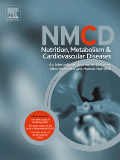
NUTRITION METABOLISM AND CARDIOVASCULAR DISEASES
Scope & Guideline
Bridging the gap between nutrition, metabolism, and cardiovascular care.
Introduction
Aims and Scopes
- Nutrition and Metabolism:
The journal covers research on how various dietary components affect metabolic processes, including energy balance, lipid profiles, and glucose metabolism. This includes studies on specific nutrients, dietary patterns, and their associations with metabolic diseases. - Cardiovascular Disease Prevention and Management:
Research published in the journal focuses on the role of nutrition in preventing cardiovascular diseases (CVDs) and managing existing conditions. This includes studies on dietary interventions, lifestyle modifications, and their impacts on cardiovascular health. - Public Health and Epidemiology:
The journal emphasizes public health approaches, including epidemiological studies that explore the relationship between dietary habits, metabolic health, and cardiovascular outcomes across diverse populations. - Innovative Research Methodologies:
The journal showcases innovative research methodologies, including randomized controlled trials, cohort studies, and meta-analyses that investigate the effects of nutrition on metabolism and cardiovascular health. - Interdisciplinary Approaches:
Research that combines insights from nutrition science, endocrinology, cardiology, and public health is prioritized, reflecting the complex interplay between diet, metabolism, and cardiovascular outcomes.
Trending and Emerging
- Plant-Based Diets:
There is a growing body of research focusing on the health benefits of plant-based diets, including their effects on cardiovascular health, metabolic syndrome, and overall well-being. Studies often explore vegetarian and vegan dietary patterns and their implications for chronic disease prevention. - Personalized Nutrition:
Emerging studies emphasize the concept of personalized nutrition, which tailors dietary recommendations based on individual genetic, metabolic, and lifestyle factors. This approach aims to optimize dietary interventions for better health outcomes. - Inflammation and Cardiovascular Risk:
Research linking dietary patterns to inflammatory markers and cardiovascular risk is increasing. Investigations into how specific foods and dietary patterns can modulate inflammation are becoming prominent. - Microbiome and Cardiometabolic Health:
The relationship between gut microbiota and cardiovascular health is gaining attention. Emerging studies explore how dietary interventions can influence the gut microbiome and, subsequently, metabolic and cardiovascular outcomes. - Sustainable Diets:
There is a rising interest in the sustainability of dietary patterns, focusing on the environmental impact of food choices and their relationship with health outcomes. Research is increasingly addressing how sustainable diets can contribute to both personal and planetary health.
Declining or Waning
- Traditional Dietary Guidelines:
Research centered on traditional dietary guidelines, such as low-fat diets or specific food groups, seems to be less frequent as newer, more nuanced dietary patterns and their impacts on health gain traction. - Single Nutrient Studies:
There is a noticeable decline in studies focusing solely on individual nutrient effects. The trend is moving towards holistic dietary patterns rather than isolated nutrient analysis. - Generalized Population Studies:
Research that examines general populations without considering specific demographic or lifestyle factors is becoming less common. The focus is shifting towards more targeted studies that consider individual variability and specific subpopulations. - Outdated Dietary Supplements Research:
Studies investigating the effects of outdated or less relevant dietary supplements are decreasing, as researchers prioritize evidence-based dietary interventions and comprehensive lifestyle changes. - Basic Mechanistic Studies:
There is a waning interest in basic mechanistic studies that do not translate into practical dietary recommendations or public health strategies. The journal is increasingly prioritizing research with direct implications for clinical practice and public health.
Similar Journals
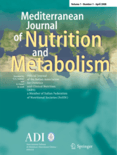
Mediterranean Journal of Nutrition and Metabolism
Championing Rigorous Research in Nutrition ScienceMediterranean Journal of Nutrition and Metabolism, published by IOS PRESS, is a leading platform dedicated to advancing the scientific discourse in the fields of nutrition and metabolism. Established in 2008, this journal addresses the increasing importance of dietary and metabolic research as it relates to human health. With an ISSN of 1973-798X and an E-ISSN of 1973-7998, it provides a vital resource for researchers and professionals aiming to explore the intricate relationships between nutrition, dietetics, and metabolic health. The journal is indexed in various categories, achieving notable rankings such as Q3 in Food Science and Nutrition and Dietetics, reflecting its commitment to rigorous scientific standards and impactful research. While the Mediterranean Journal of Nutrition and Metabolism currently does not operate under an Open Access model, it offers invaluable insights and findings that are essential for those dedicated to understanding and improving nutritional practices globally. By fostering collaboration and innovation, this journal serves as a cornerstone for scholars, supporting the dissemination of knowledge that enhances health outcomes across diverse populations.

Journal of Nutrition and Metabolism
Innovating Dietary Insights for a Healthier TomorrowJournal of Nutrition and Metabolism, published by HINDAWI LTD, is a prominent peer-reviewed, open-access journal that has been serving the scientific community since 2010. Based in Egypt, this journal is dedicated to advancing the field of nutrition and metabolism, providing a platform for innovative research that spans endocrinology, diabetes, food science, and dietetics. With a consistent commitment to accessibility, it embraces open-access policies to facilitate wider dissemination of knowledge, ensuring that researchers, professionals, and students can freely engage with pivotal studies and findings. The journal is currently indexed with an impressive standing in various categories, including being positioned in Q2 in Food Science and Q3 in Endocrinology, Diabetes and Metabolism. Furthermore, it ranks among the top journals in its fields on Scopus, reflecting its significance and impact within the research community. With a focus on robust, evidence-based studies that inform dietary practices and metabolic health, the Journal of Nutrition and Metabolism plays a crucial role in addressing the challenges of modern nutrition.

Nutrition Journal
Advancing the Science of Nutrition for a Healthier Tomorrow.Nutrition Journal is a prestigious open-access publication from BMC, dedicated to advancing the field of nutrition and dietetics since its inception in 2002. With an impressive impact factor and a notable Scopus ranking, it ranks in the top quartile (Q1) in both Medicine (miscellaneous) and Nutrition and Dietetics, highlighting its significant contribution to health sciences. Based in the United Kingdom, the journal covers a broad spectrum of topics, making it an essential resource for researchers, healthcare professionals, and students interested in nutrition's role in health and disease prevention. The journal not only facilitates the dissemination of groundbreaking research but also prioritizes accessibility, allowing global audiences to engage with vital findings that shape dietary practices and public health policies. With a commitment to interdisciplinary collaboration, Nutrition Journal fosters an environment where innovative ideas and evidence-based solutions can flourish, making it a cornerstone reference in the field.
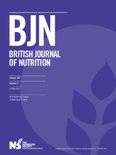
BRITISH JOURNAL OF NUTRITION
Advancing the Frontiers of Nutritional ScienceThe British Journal of Nutrition, a premier publication in the field of nutrition and dietetics, is brought to you by Cambridge University Press. Established in 1947, this journal has consistently provided a platform for groundbreaking research and innovation in the domain of nutrition, boasting an impressive converged timeline extending to 2024. Recognized for its high academic standards, it proudly holds a Q1 ranking in Medicine (miscellaneous) and a Q2 ranking in Nutrition and Dietetics as of 2023, reflecting its impact and relevance in the scientific community. With a Scopus rank of 75 out of 398 in Medicine and 38 out of 140 in Nutrition and Dietetics, the journal remains a vital resource for researchers, professionals, and students seeking to enhance their knowledge and understanding of nutritional science. While the journal is not open access, it offers a wealth of valuable insights, making it an essential addition to any academic collection focused on health and nutrition.

NUTRITION
Shaping public health through nutritional research.NUTRITION is a prestigious peer-reviewed journal published by Elsevier Science Inc, dedicated to advancing the field of dietary practices and metabolism. With an ISSN of 0899-9007 and an E-ISSN of 1873-1244, this journal has been serving the academic community since its inception in 1987, showcasing high-quality research and reviews through 2024. Recognized for its significant contributions to the fields of Endocrinology, Diabetes and Metabolism and Nutrition and Dietetics, NUTRITION holds a commendable Q2 category ranking in both areas, reflecting its impactful presence with a Scopus rank of #26 out of 140 and #51 out of 244 in its respective categories. The journal primarily aims to disseminate innovative research findings that illuminate the complex interplay between nutrition and health, fostering a deeper understanding among researchers, healthcare professionals, and students alike. By bridging scientific inquiry with practical application, NUTRITION plays a vital role in shaping public health policies and dietary recommendations worldwide.

Nutrients
Unveiling the future of nutrition through open access knowledge.Nutrients is a premier, peer-reviewed open access journal published by MDPI, dedicated to advancing the field of nutrition and dietary research. Since its inception in 2009, this journal has consistently garnered acclaim, achieving a Q1 ranking in both Food Science and Nutrition and Dietetics, reflecting its significant impact in these vital areas of study. With a robust Scopus ranking of #40 out of 389 in Food Science and #18 out of 140 in Nutrition and Dietetics, Nutrients has established itself as a leading platform for researchers, practitioners, and students aiming to share and gain insights into nutritional epidemiology, dietary interventions, and policy implications. Hailing from Basel, Switzerland, the journal ensures broader accessibility through its open access model, inviting diverse contributions that enhance our understanding of nutrition in health and disease. By fostering collaboration across disciplines, Nutrients not only serves as a resource for high-quality research but also encourages innovation essential for tackling global nutritional challenges.

Journal of Atherosclerosis and Thrombosis
Exploring breakthroughs in atherosclerosis and thrombosis research.Journal of Atherosclerosis and Thrombosis is a leading academic publication dedicated to advancing research in the fields of cardiovascular medicine, biochemistry, and internal medicine. Published by the Japan Atherosclerosis Society, this esteemed journal operates from its headquarters in Tokyo, Japan, and has been a vital resource in its area since its inception in 1994. With its robust impact in Cardiology and Cardiovascular Medicine, ranking in the top quartile (Q1) as of 2023, and a commendable standing in Internal Medicine and Biochemistry, the journal fosters an environment of innovation and discovery, showcasing significant studies and advancements that shape clinical practices and therapeutic approaches. Though not an open-access publication, it offers a wealth of insights to researchers, professionals, and students seeking to deepen their understanding of atherosclerosis and thrombosis. By continually featuring high-quality articles, the Journal of Atherosclerosis and Thrombosis plays an essential role in bridging the gap between research and practice, facilitating critical conversations that influence the future of cardiovascular health.

Cardiovascular Endocrinology & Metabolism
Bridging Cardiovascular Health and Endocrine InsightsCardiovascular Endocrinology & Metabolism is a leading open-access journal dedicated to advancing our understanding of the interconnections between cardiovascular health and endocrine functions. Published by Lippincott Williams & Wilkins, this journal serves as a vital resource for researchers and clinicians alike, providing timely insights into the intricate relationships between metabolic disorders and cardiovascular diseases. With an impressive impact factor and categorized in Q2 for both Cardiology and Cardiovascular Medicine as well as Endocrinology, Diabetes, and Metabolism, it holds a significant position within its respective fields. The journal has been fully open access since its inception in 2012, ensuring that critical research is accessible to a global audience. By fostering innovation and collaboration, Cardiovascular Endocrinology & Metabolism aims to promote better health outcomes and stimulate novel research directions, making it an essential resource for professionals striving to bridge the gaps between these two critical domains.
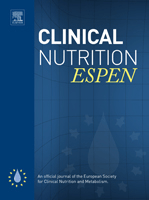
Clinical Nutrition ESPEN
Pioneering Insights in Clinical Nutrition and DieteticsClinical Nutrition ESPEN is a distinguished journal published by ELSEVIER, focusing on the critical intersection of clinical nutrition and metabolic health. With an ISSN of 2405-4577, this journal serves as an essential resource for researchers, practitioners, and students in the fields of Endocrinology, Diabetes and Metabolism as well as Nutrition and Dietetics. Operating out of the United Kingdom, it has garnered a respectable Q2 ranking in both categories for 2023, indicating its significant impact and relevance in the field. Although it does not follow an open access model, the journal offers valuable insights into contemporary nutrition research, clinical practices, and dietary interventions, making it a vital tool for those committed to improving patient outcomes through nutritional science. In its evolving journey, covering work from 2015 to 2024, Clinical Nutrition ESPEN continues to shape the dialogue in nutrition research, addressing pressing health challenges and fostering innovation in dietetic practice.
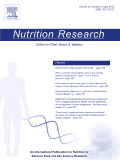
NUTRITION RESEARCH
Fostering Collaboration for Enhanced Dietary UnderstandingNUTRITION RESEARCH, published by PERGAMON-ELSEVIER SCIENCE LTD, stands as a pivotal platform for the dissemination of groundbreaking research in the fields of nutrition, dietetics, and endocrinology. With an established track record since 1981, the journal has successfully converged its academic purview into 2024, providing a continuous source of high-impact studies that address critical issues in human health and nutrition. Recognized as a Q2 journal in multiple relevant categories, including Endocrinology and Nutrition, as well as boasting respectable Scopus rankings, it serves a diverse audience of researchers, professionals, and students eager to enhance their understanding of nutritional science. Although the journal does not operate on an open access model, its contributions are invaluable, fostering advancements and collaboration within the scientific community dedicated to improving dietary practices and outcomes. The current address of the journal is THE BOULEVARD, LANGFORD LANE, KIDLINGTON, OXFORD OX5 1GB, ENGLAND, positioning it at the heart of global research initiatives.